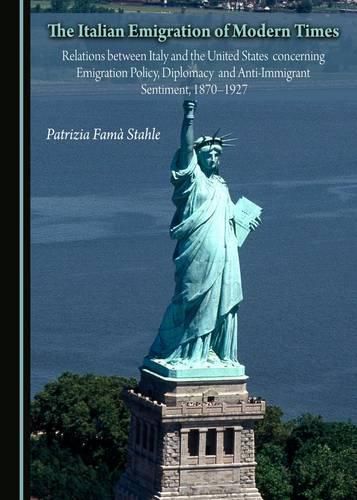Readings Newsletter
Become a Readings Member to make your shopping experience even easier.
Sign in or sign up for free!
You’re not far away from qualifying for FREE standard shipping within Australia
You’ve qualified for FREE standard shipping within Australia
The cart is loading…






The Italian Emigration of Modern Times examines diplomatic issues that arose between Italy and the United States over a series of lynchings of Italian immigrant labourers before World War I. The work explores a significant epoch in Italian economic and diplomatic history which became intertwined with American ethnic and race relations issues. On one level, the book emphasises the pragmatism and restraint which characterized Italy’s official reactions to these repeated episodes of murder of its nationals. On another level, it shows that the diplomatic crises which swirled around the lynching of Italians pushed onto the American political scene the question of whether there should be a federal anti-lynching law.Naturally, the lynching of Italian nationals in the US produced wide public outrage in Italy. Italian domestic outcries presented the Italian government with a serious dilemma. Emigrant savings and financial transfers to family members remaining in Italy were an important economic asset. Italian diplomats launched investigations and protested vigorously, but ended up accepting federal financial compensation for the victims’ families. The consistent pragmatism and restraint of the Italian government through these episodes of violence is the unifying theme of the entire work.
$9.00 standard shipping within Australia
FREE standard shipping within Australia for orders over $100.00
Express & International shipping calculated at checkout
The Italian Emigration of Modern Times examines diplomatic issues that arose between Italy and the United States over a series of lynchings of Italian immigrant labourers before World War I. The work explores a significant epoch in Italian economic and diplomatic history which became intertwined with American ethnic and race relations issues. On one level, the book emphasises the pragmatism and restraint which characterized Italy’s official reactions to these repeated episodes of murder of its nationals. On another level, it shows that the diplomatic crises which swirled around the lynching of Italians pushed onto the American political scene the question of whether there should be a federal anti-lynching law.Naturally, the lynching of Italian nationals in the US produced wide public outrage in Italy. Italian domestic outcries presented the Italian government with a serious dilemma. Emigrant savings and financial transfers to family members remaining in Italy were an important economic asset. Italian diplomats launched investigations and protested vigorously, but ended up accepting federal financial compensation for the victims’ families. The consistent pragmatism and restraint of the Italian government through these episodes of violence is the unifying theme of the entire work.